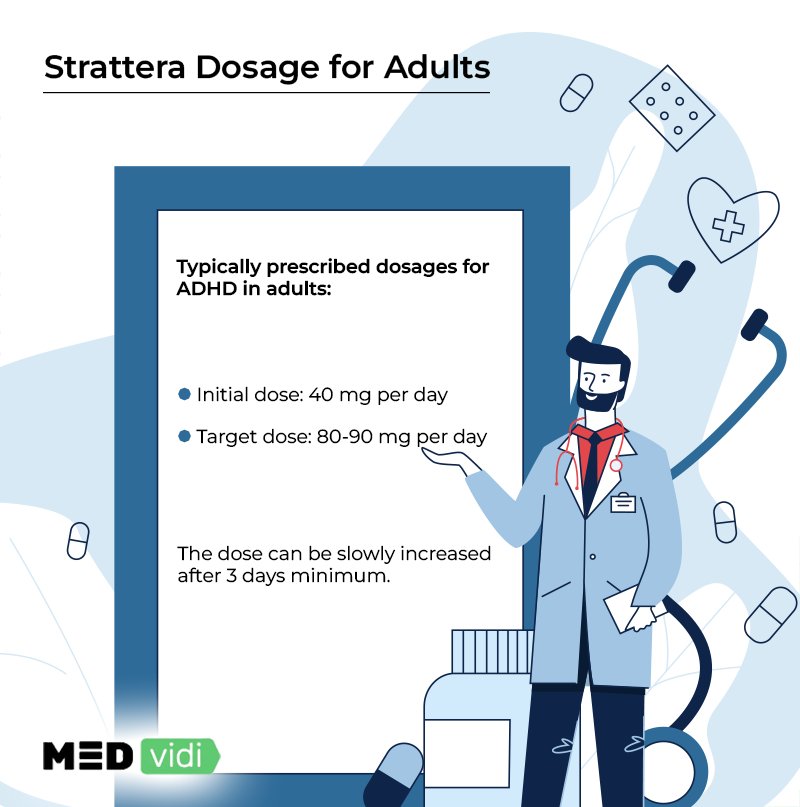Numerous medications can be used for ADHD treatment, but the two drug classes that are most frequently prescribed are stimulants and non-stimulants. One commonly chosen non-stimulant medication is Strattera; sometimes, it is referred to by the generic name Atomoxetine. This medication has
This article will describe the drug Strattera so that you know more about how it can help you overcome ADHD symptoms and other aspects:
- How Strattera works
- What it treats
- Dosage options
- Side effects
- Treatment duration
- How to quit using Strattera
Continue reading!
Get the right medical advice for your ADHD from certified doctors at MEDvidi.
How Does Strattera Work for ADHD?
For a long time, Strattera has been marketed as the first ADHD non-stimulant drug. It is used to treat the distractibility, impulsivity, and hyperactivity that are hallmarks of attention deficit hyperactivity disorder (ADHD) in kids, teenagers, and adults. It is a selective norepinephrine reuptake inhibitor, also known as a NET inhibitor.
Average norepinephrine levels have been reported to be
Benefits of Strattera for ADHD
According to a
How effective is Strattera for ADHD? |
|
Connect to the best-reviewed online platform for medical advice. Click the button below!
Dosage
Strattera dosage varies from patient to patient according to their symptoms and weight. Typically, a doctor starts from the lowest dose and then increases it gradually until it starts to control the symptoms. 100 mg per day is the maximum recommended dosage.
Strattera capsules are available in strengths of 10 mg, 18 mg, 25 mg, 40 mg, 80 mg, and 100 mg. The use of time-release medicines is also available to keep the medicine level in your body constant all day long.
Typically prescribed dosages for adults who weigh more than 70 kg are as follows:
- Initial dose is 40 mg per day
- Target dose is 80-90 mg per day
- Maximum dose is 100 mg per day
The dose can be slowly increased after 3 days minimum.

Side Effects of Strattera
Common side effects of Strattera include:
- Insomnia
- Constipation
- Reduced appetite
- Urinary problems
- Hives
- Itching
- Fainting
- Irregular heartbeat
- Sexual dysfunction
- Painful menstruation
- Stomach upset
If you suffer any of your medication’s side effects, seek medical attention.
How Does Strattera Make You Feel?
Being a non-stimulant ADHD medication, Strattera takes some time (often 4+ weeks at first) for the desired benefits to appear. However, the adverse effects may begin to manifest quickly, such as decreased appetite and occasionally difficult sleep (but don’t let that stop you from using it!).
The fact that Strattera takes time to develop its effects is one of the most significant distinctions between stimulants and non-stimulants. Strattera’s effect lasts for about 24 hours and is taken daily, so there are no ups and downs if taken consistently. On the other hand, stimulants often act immediately and last for a specific number of hours, usually fewer than 24.
The withdrawal symptoms and adverse effects of non-stimulants are also significantly less severe. And finally, the lack of anxiety-inducing side effects of Strattera is one of its advantages over stimulants.
Do You Have to Wean Off of Strattera?
Strattera is not a controlled substance. The majority of people who quit using medication report only very mild symptoms of withdrawal. This can be explained by the fact that Strattera primarily targets norepinephrine, and more severe withdrawal effects may be associated with drugs that influence dopamine or serotonin, for example. If patients suffer withdrawal symptoms while using Strattera, they often fade quickly.
Wrap-up
Strattera can help ADHD patients better pay attention, stay focused, concentrate, and stop fidgeting once they start taking it. However, consult a psychiatrist or another medical expert to get the right option of medication for ADHD in adults. Connect with MEDvidi doctors for quick and reliable services.













